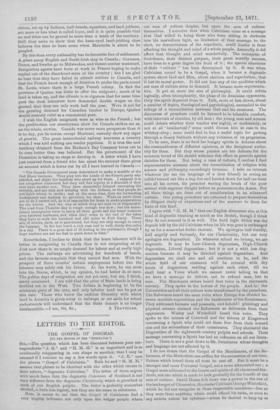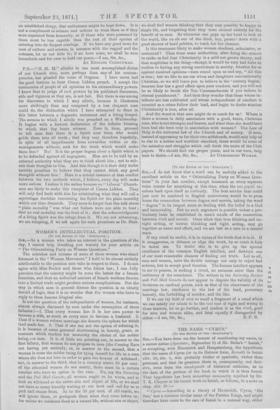LETTERS TO THE EDITOR.
THE GOSPEL OF DOGMAS.
[TO THE BETTOR OF THE " BEEOTATOR.1
SIR,—The question which has been discussed between your cor- respondents "J. R." and "H. M. M." is so important and is so continually reappearing in one shape or another, that I may be excused if I venture to say a few words upon it. "J. R." uses the phrase " Gospel of Calvinism." Both he and " H. M. M." assume that phrase to be identical with the other which occurs in their letters, " dogmatic Calvinism." The latter of them argues with much force that the dogmatic Calvinism of Scotland is not very different from the dogmatic Christianity which is preached in most of our English pulpits. The latter is probably somewhat diluted, a little less logical, but they are the same in substance. Now, it seems to me that the Guspel of Calvinism had a very mighty influence not only upon the vulgar people whom our men of culture despise, but upon the men of culture themselves. I conceive that when Calvinism came as a message that God willed to bring those who were sitting in darkness into his marvellous light, no limitation of that message to the elect, no denunciations of the reprobate, could hinder it from affecting the thought and mind of a whole people. Assuredly it did affect that thought and mind wonderfully. The enterprise of Scotchmen, their distinct purpose, their great worldly success, have been to a great degree the fruit of it ; the special character of their " culture " has been determined by it. It was when Calvinism ceased to be a Gospel, when it became a dogmatic system about God and Man, about election and reprobation, that it lost its moral power. It did not lose any of the qualities which our men of culture seem to demand. It became more argumenta- tive. It put on more the airs of philosophy. It could refute logically, often triumphantly, the pleas of its Arminian opponents. Only the spirit departed from it. Talk, more or less clever, about a number of topics, theological and psychological, succeeded to the tidings of a reconciliation between God and his creatures. The discourses of preachers could be listened to in tolerable comfort, with intervals of slumber, by old men ; the young men and women could debate whether their teacher was highly, or moderately, or not at all intellectual ;' some could discuss him at ease in the whiskey-shop ; some could find in him a useful topic for getting through a dreary Sabbath without any violation of its proprieties.
To be sure, there is no food for hungry spirits in debates about the reasonableness of different opinions, or the Scriptural autho- rity for them. But they whose palates are too delicate for the common bread of life should welcome this effort to provide special dainties for them. Not being a man of culture, I confess I find argumentative sermons about the reconciliation of religion with science and philosophy exceedingly tiresome. I take no interest whatever (to use the language of a dear friend) in seeing an infidel turned out like a bag-fox and hunted down for half-au-hour into all his covers, the preacher waving the brush of the poor animal with supreme delight before he pronounces the Amen. But all these things are done out of consideration to an advanced culture. Our young preachers are exhorted to prepare themselves by diligent study of objections aud of the answers to them for feats of this kind.
I agree with " H. M. M." that our English discourses aim at this kind of dogmatic teaching as much as the Scotch, though I think they do not succeed in it so well. The hard logic which was the deposit left by the old Calvinism when its life was gone is exchanged by us for a somewhat feeble rhetoric. We apologize half timidly, half angrily and furiously, for our Christianity, but our very apologies are dogmatical. To whatever school we belong, we are dogmatic. It may be Low-Church dogmatism, High-Church dogmatism, Liberal dogmatism ; but it is not a whit less dog- matism because it may be directed against dogmatism. And dogmatists we shall one and all continue to be, and the whole field of our existence will be covered with dry bones of dogmatism rattling against each other, till we shall hear a Voice which we cannot resist telling us that we have a message to deliver, not to refined men, but to men. The Mendicant orders heard that voice in the thirteenth century. They spoke to the lowest of the people. And lo the Universities and all their culture were transformed by the preachers. The Reformers heard the same voice whoa Europe was divided be- tween monkish superstition and the heathenism of the Renaissance. They addressed farmers and peasants, aud behold I philology and physical science claimed the Reformers as deliverers from their oppressors. Wesley and Whitefield heard this voice. They spoke to the miners of Cornwall and the thieves of Kingswood concerning a Spirit who could set them free from their inward aims and the accusations of their consciences. They shattered the Dogmatism of the eighteenth-century pulpits and schools. Their message concerning a Spirit has had an inguence on all our litera- ture. There is not a poet down to Mr. Swinburne whose thoughts and language are not affected by it.
I do not dream that the Gospel of the Mendicants, of the Re- formers, of the Methodists can suffice for the necessities of our time. Fetters which bound them all must be cast off. But it must be a stronger and more Universal Gospel, not a more attenuated one ; Gospel more addressed to the hearts and spirits of all classes and kin- dreds, not one which is made to look genteelly for the benefit of the men of culture. David Hume felt there was a power in the son of the innkeeper of Gloucester, the coarse Calvinist George Whitefield, which he did not recognize in those respectable ministers—free as they were from anything which could offend his taste, or even to any serious extent his opinions—whom he desired to keep up as
an established clergy, that enthusiasm might be kept down. It is i
not a compliment to science and culture to treat them as if they were separated from humanity, as if those who were possessed by them must be less capable than the rest of their species of entering into its deepest cravings. If we have any good news for men of culture and science, in common with the ragged and the outcasts, let us not hide it ; if we have none, we shall be wise henceforth and for ever to hold our peace.—I am, Sir, &c.,
AN ENGLISH CLERGYMAN.
P.S..--44 H. M. M." alludes to one most accomplished divine of our Church who, more perhaps than any of his contem- poraries, has pleaded the cause of Dogmas. I have never had the good fortune to hear Canon Liddon preach. I accept the testimonies of people of all opinions to his extraordinary powers. I know that to judge of such powers by his published discourses, able and vigorous as they are, is not fair. But there is one among his discourses to which I may allude, because it illustrates more strikingly than any composed by a less eloquent man could do, the distinction which I have attempted to draw in this letter between a dogmatic statement and a living Gospel. The sermon to which I allude was preached on a Whitsunday. It begins with a fervent declaration of the infinite blessing to which that day bears witness. Does it, then, proceed to toll men that there is a Spirit near them who would guide them into all truth ; that they may therefore hopefully, in spite of all impediments from cowardice within or dis- couragemeuts without, seek for the truth which would make them free? No! It is the proper dogma about a Spirit which is to be defended against all impugners. Men are to be told by an external authority what they are to think about him ; not to sub- mit their thoughts to him. And this though it is their duty uuder terrible penalties to believe that they cannot think any good thoughts without him ! Here is a crucial instance of that conflict between the two methods which, I believe, every day will make more serious. I notice it the rather because no " Liberal " Church- men are likely to make this complaint of Canon Liddon. They will only find fault with him for substituting what they will call a mystericeis doctrine concerning the Spirit for the plain morality which our time demands. They seem to forget that this talk about "plain morality " was what our fathers were not able to bear ; that no real morality was the fruit of it ; that the acknowledgment of a living Spirit was the refuge from it. We are not advancing, we are relapsing, if we ask again for such preachers as Dr. Blair.































 Previous page
Previous page